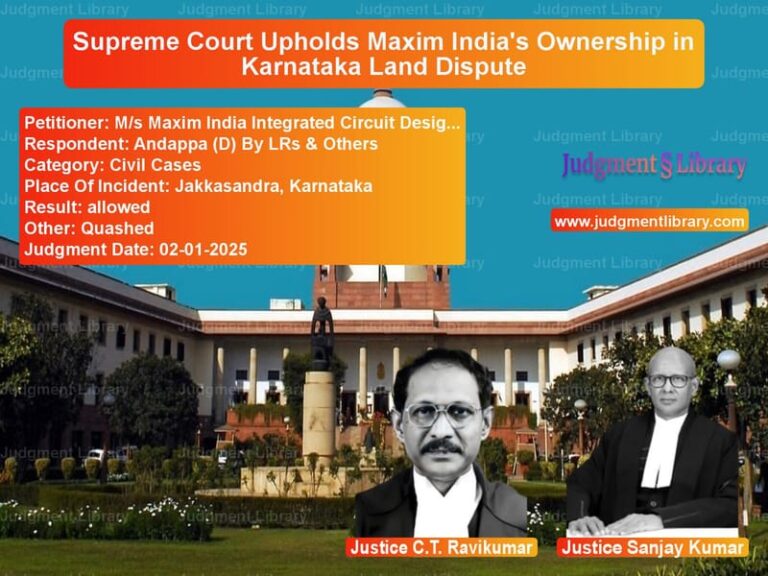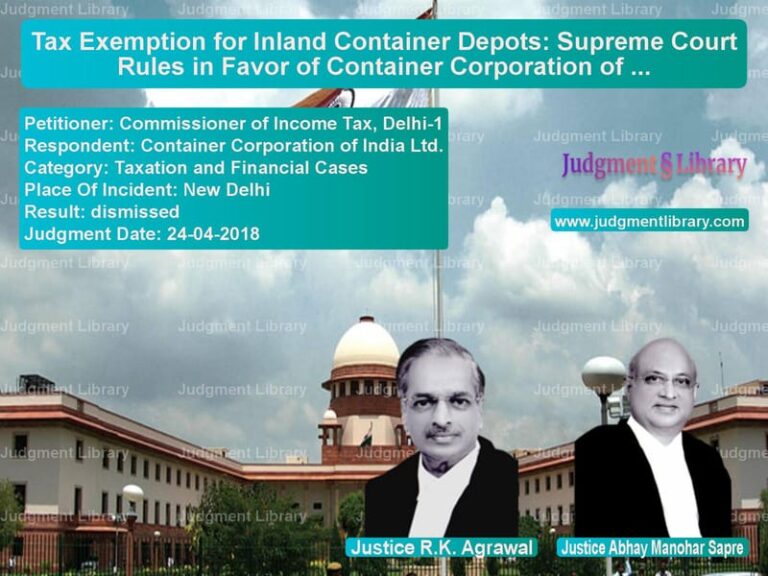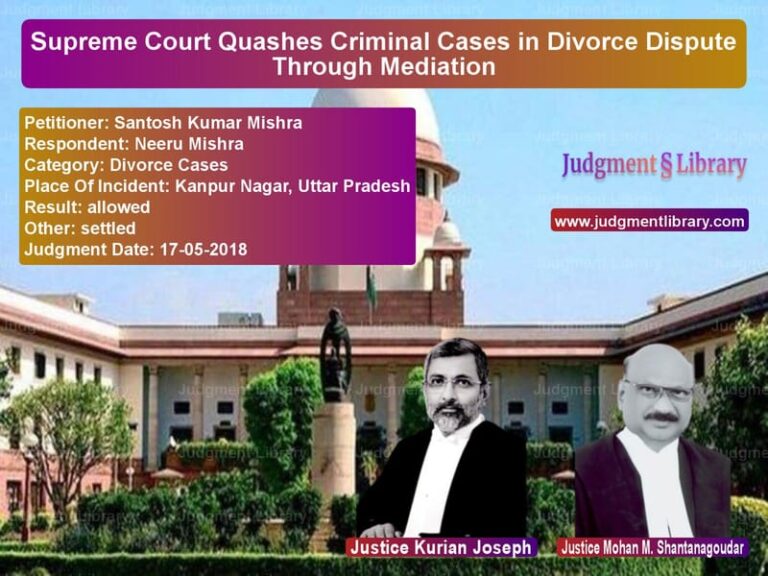Supreme Court Denies Age Relaxation for Municipal Teachers in Government Recruitment
The Supreme Court of India, in the case of Delhi Subordinate Services Selection Board & Anr. v. Seema Kapoor, addressed whether teachers employed in municipal corporations could claim age relaxation benefits reserved for government servants and departmental candidates while applying for positions in government educational institutions.
Background of the Case
The respondent, Seema Kapoor, was employed as a Primary Teacher with the South Delhi Municipal Corporation since April 7, 2006. She applied for the post of PGT (English) (Female) under Post Code No. 133/2012, which was advertised under Advertisement No. 2/2012 by the Delhi Subordinate Services Selection Board (DSSSB). The eligibility criteria stated that the maximum age limit was 36 years, with an additional five-year relaxation for government servants and departmental candidates.
Kapoor, who was born on February 10, 1976, was beyond the prescribed age limit as of the application deadline (June 15, 2012). However, she claimed that she was entitled to age relaxation, arguing that the municipal corporation fell within the ambit of a government organization.
Legal Issues Considered
- Whether employees of municipal corporations qualify as government servants for the purpose of age relaxation in public service recruitments.
- Whether the respondent could be classified as a departmental candidate eligible for the relaxation.
- Whether the High Court erred in applying provisions of a subsequent recruitment advertisement (2016) while adjudicating the case.
Petitioner’s Arguments (DSSSB)
The DSSSB, representing the government, argued that:
- The respondent was neither a government servant nor a departmental candidate under the concerned recruitment advertisement.
- The Government of India’s circular dated March 27, 2012, explicitly stated that age relaxation benefits were limited to central government civilian employees and not applicable to employees of autonomous bodies or public sector undertakings.
- The High Court erred in relying on provisions from a later recruitment advertisement (2016) which were not relevant to the recruitment in question.
- The Supreme Court had previously ruled in Jai Prakash Wadhwa v. Lt. Governor, Delhi Administration that teachers employed in municipal corporations are not government servants.
Respondent’s Arguments (Seema Kapoor)
The respondent countered the claims, stating that:
- The municipal corporation functioned under the control of the state government and should be treated as a government entity for recruitment purposes.
- The Recruitment Rules for the post of Trained Graduate Teacher (MIL) under the Directorate of Education, Delhi Administration, provided a promotion channel for municipal teachers, establishing them as departmental candidates.
- Failure to grant age relaxation would amount to discriminatory treatment of municipal teachers compared to their counterparts in government schools.
Supreme Court’s Observations
The Supreme Court, in a detailed analysis, clarified the distinction between municipal corporation employees and government servants. The Court ruled:
“The expression ‘departmental candidates’ refers to employees working directly in the concerned government department. A municipal corporation, although functioning under a legislative framework, remains an autonomous body and cannot be equated with the government.”
The Court further emphasized:
- The High Court erred in quoting provisions from a later recruitment process (2016) rather than applying the relevant advertisement from 2012.
- Municipal corporations are governed by independent statutes and do not fall under the direct administrative control of the central or state government.
- The recruitment process in question strictly limited the age relaxation benefit to government servants and departmental candidates, excluding employees of autonomous bodies.
Final Judgment
The Supreme Court allowed the appeal, ruling in favor of the DSSSB. It set aside the orders of the High Court and the Central Administrative Tribunal, reaffirming that municipal teachers are not entitled to age relaxation benefits reserved for government servants.
Read also: https://judgmentlibrary.com/study-leave-for-government-doctors-supreme-court-ensures-fair-treatment/
Impact of the Judgment
The ruling has significant implications for recruitment policies:
- Clarification on Age Relaxation Criteria: The judgment reinforces that only central government employees and departmental candidates qualify for age relaxation.
- Employment Classification: The ruling clearly distinguishes municipal corporation employees from government servants.
- Precedent for Future Cases: The decision will serve as a reference for similar disputes involving autonomous bodies and government recruitment.
Conclusion
The Supreme Court’s decision in Delhi Subordinate Services Selection Board v. Seema Kapoor upholds the principle that autonomous body employees cannot claim the same benefits as government servants unless expressly provided by statute. By reaffirming existing legal precedents, the ruling ensures consistency and fairness in public sector employment policies.
Petitioner Name: Delhi Subordinate Services Selection Board & Anr..Respondent Name: Seema Kapoor.Judgment By: Justice Sanjay Kishan Kaul, Justice Hemant Gupta.Place Of Incident: Delhi.Judgment Date: 22-07-2021.
Don’t miss out on the full details! Download the complete judgment in PDF format below and gain valuable insights instantly!
Download Judgment: delhi-subordinate-se-vs-seema-kapoor-supreme-court-of-india-judgment-dated-22-07-2021.pdf
Directly Download Judgment: Directly download this Judgment
See all petitions in Employment Disputes
See all petitions in Recruitment Policies
See all petitions in Public Sector Employees
See all petitions in Promotion Cases
See all petitions in Judgment by Sanjay Kishan Kaul
See all petitions in Judgment by Hemant Gupta
See all petitions in allowed
See all petitions in supreme court of India judgments July 2021
See all petitions in 2021 judgments
See all posts in Service Matters Category
See all allowed petitions in Service Matters Category
See all Dismissed petitions in Service Matters Category
See all partially allowed petitions in Service Matters Category







